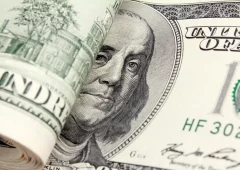Crypto Firm Co-Founder Admits to $9M Fraud Scheme
12.01.2025 20:00 1 min. read Alexander Stefanov
A cryptocurrency firm co-founder has admitted to defrauding thousands of investors through false claims of high returns, raising over $9 million before his scheme unraveled.
Travis Ford, the co-founder and head trader at Wolf Capital, pleaded guilty to wire fraud conspiracy, according to a January 10 statement from the U.S. Department of Justice (DOJ).
Between January and August 2023, Ford convinced approximately 2,800 individuals to invest $9.4 million, promising returns as high as 1-2% daily, which translates to an unrealistic 547% annually. Ford promoted the scheme heavily through Wolf Capital’s website, social media, and online platforms, portraying himself as a seasoned trader capable of delivering such returns. However, instead of investing the funds as promised, he diverted them for personal use and to enrich his co-conspirators.
The DOJ revealed that Ford acknowledged the impossibility of consistently achieving the promised returns. He now faces up to five years in prison, with sentencing yet to be scheduled.
Ford’s case is one of many recent efforts to combat crypto-related scams globally. In Vietnam, authorities arrested four individuals involved in a fraudulent crypto mining operation that scammed over 200 victims out of $157,300. Meanwhile, law enforcement in Springfield, Massachusetts, warned residents about an increase in cryptocurrency ATM scams, where victims are directed to transfer funds directly to scammers.
-
1
Samourai Wallet Case Faces Scrutiny After Allegations of Withheld Evidence
07.05.2025 13:00 2 min. read -
2
$330M Bitcoin Heist Traced to Social Engineering Scam Targeting U.S. Senior
04.05.2025 12:00 2 min. read -
3
Alex Mashinsky Seeks One-Year Sentence as DOJ Pushes for 20 Years
08.05.2025 12:00 1 min. read -
4
Celsius CEO Sentenced to 12 Years Over $5 Billion Crypto Scandal
09.05.2025 10:00 2 min. read -
5
Man Sentenced to 30 Years for Using Crypto to Fund ISIS Operations
10.05.2025 11:00 1 min. read
Man Sentenced to 30 Years for Using Crypto to Fund ISIS Operations
A U.S. court has handed down a 30-year prison sentence to Mohammed Azharuddin Chhipa, who was found guilty of financing terrorism through cryptocurrency.
Celsius CEO Sentenced to 12 Years Over $5 Billion Crypto Scandal
A major chapter in crypto’s legal reckoning closed this week as Alex Mashinsky, once a prominent name in digital lending, received a 12-year prison sentence.
Alex Mashinsky Seeks One-Year Sentence as DOJ Pushes for 20 Years
Former Celsius CEO Alex Mashinsky is asking for a significantly reduced prison sentence ahead of his May 8 sentencing, with his legal team pushing back hard against the U.S. Department of Justice’s call for a 20-year term.
Samourai Wallet Case Faces Scrutiny After Allegations of Withheld Evidence
The legal battle against the creators of Samourai Wallet has taken a sharp turn, as defense attorneys accuse federal prosecutors of suppressing a key legal interpretation from the Treasury Department that could dismantle the core of the government’s case.
-
1
Samourai Wallet Case Faces Scrutiny After Allegations of Withheld Evidence
07.05.2025 13:00 2 min. read -
2
$330M Bitcoin Heist Traced to Social Engineering Scam Targeting U.S. Senior
04.05.2025 12:00 2 min. read -
3
Alex Mashinsky Seeks One-Year Sentence as DOJ Pushes for 20 Years
08.05.2025 12:00 1 min. read -
4
Celsius CEO Sentenced to 12 Years Over $5 Billion Crypto Scandal
09.05.2025 10:00 2 min. read -
5
Man Sentenced to 30 Years for Using Crypto to Fund ISIS Operations
10.05.2025 11:00 1 min. read

